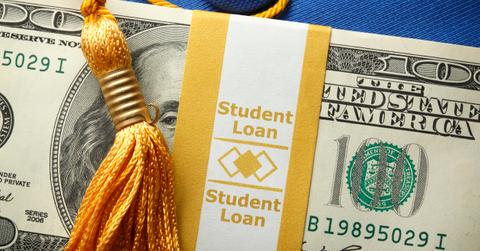Should You Invest in Stocks to Pay Off Student Loans?
The prospect of using the stock market to pay off debt is an enticing one, especially as stocks such as Tesla soar.
July 30 2020, Updated 8:33 a.m. ET

The prospect of using the stock market to pay off debt is enticing. With the average graduating student facing loans of $29,200 in 2018, the weight of student loan debt and the interest that comes with it, has many people asking whether they should invest in the stock market to pay off their student loans.
Investing in stocks to pay off student loans
It's important to understand that the stock market does not usually act the way it has during the coronavirus pandemic. A massive sell-off of stocks when the global lockdown began in March led to what seems like massive gains for many since the market has started to recover.

It's true that if you had invested in an index or mutual fund while the market was down, you would have made some money. However, it's impossible to predict the bottom of a market, and if you invested as recently as February, you're probably down from market highs. And if fears over a second wave of coronavirus come to fruition, the market could drop even further.
Seeing single stocks soar can also be tempting to those looking to pay off debt. In January, a share in automaker and solar energy company Tesla would have set you back just $418.33, and now, that same share is going for just under $1,500. But be warned, trading single stocks can be incredibly risky. For every Tesla, there are dozens of companies that flop. When trading single stocks, most people end up losing money.
Should you invest in stocks if you have student loans?
Let's assume for a moment that the stock market is stable again, and let's also assume that you're not going to risk losing your student loan repayment money by investing in single stocks. In regular times, a 7 to 10 percent rate of return would have been considered normal when investing in index or mutual funds. However, this wouldn't mean that you'd get a consistent return every year. Your investment could fall by 10 percent one year, only to rebound by 20 percent the year after, making the stock market a bad choice for people looking for short-term gains.

The average student loan has an interest rate of 5.8 percent, according to a 2017 report by New America. And since we're looking to access any profit we make in the short term, to pay off student loans, we'll also have to pay ordinary income tax on these gains and won't be able to take advantage of a tax-free IRA (individual retirement arrangement).
When we factor in the risk of investing in the short term and having to pay tax on our gains, it will probably work out cheaper for most people just to pay off their students loans as quickly as possible. Student loans can also not be bankrupted, meaning that they're some of the most important debts to pay off as quickly as possible.
Once you've paid off those student loans, you could take that extra money and invest in index or mutual funds in the long term. And since you hopefully won't need to touch that money in the short term, you can use an IRA to avoid paying tax on those gains.
